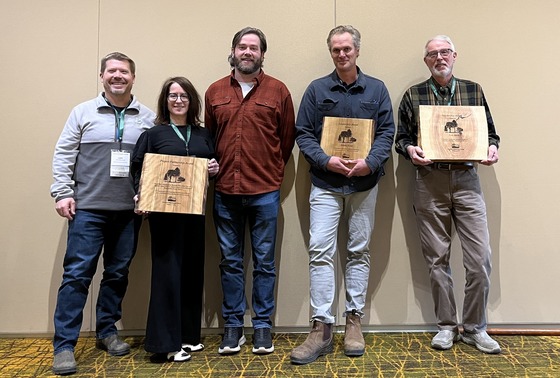Previously Undetected Parasite Discovered In Wild Wisconsin Trout
Anglers, Please Clean Your Gear
MADISON, Wis. – The Wisconsin Department of Natural Resources (DNR) urges anglers to properly clean their gear after discovering the parasite Myxobolus cerebralis in Elton Creek in Langlade County.
Myxobolus cerebralis is a microscopic parasite that damages the cartilage and nerve tissue of trout and salmon and has been known to cause whirling disease.
“It’s unknown how Myxobolus cerebralis will impact our local trout populations at this time,” said Justine Hasz, DNR Fisheries Management Bureau Director. “In some states where the parasite has been found, trout and salmon have developed whirling disease, which has negatively impacted their local populations. However, other states with the parasite have seen no evidence of fish with whirling disease nor have they seen their trout and salmon populations impacted.”
Although no fish have been discovered in Wisconsin with clinical symptoms of the disease, the DNR is implementing a surveillance program to determine if any additional trout populations have been affected.
Anglers should watch for trout or salmon displaying any signs of whirling disease like blackened tails, skeletal deformities or swimming in circles, and report sightings to their local fisheries biologist. These signs are not exclusive to whirling disease.
Myxobolus cerebralis is only capable of infecting trout and salmon, with rainbow and brook trout thought to be the most susceptible. It cannot infect other fish species and poses no threat to humans or household pets like cats and dogs.
Though cooking harvested fish according to the U.S. Food and Drug Administration’s food safety guidelines is always recommended, anglers are encouraged to never consume fish that appear sick or diseased.
Help Minimize The Spread
This parasite is nearly impossible to eradicate once it has been established, but steps can be taken to limit the spread. The DNR reminds anglers of the importance of cleaning and disinfecting their gear after fishing.
It’s also important to remember to not dispose of fish tissue or by-products into bodies of water to prevent the spread of aquatic invasive species and other fish diseases.
NOTE: This press release was submitted to Urban Milwaukee and was not written by an Urban Milwaukee writer. While it is believed to be reliable, Urban Milwaukee does not guarantee its accuracy or completeness.
Mentioned in This Press Release
Recent Press Releases by Wisconsin Department of Natural Resources
DNR Awards Brownfield Grant to City of Berlin
Feb 24th, 2026 by Wisconsin Department of Natural ResourcesFunds Will Support Environmental Assessment























